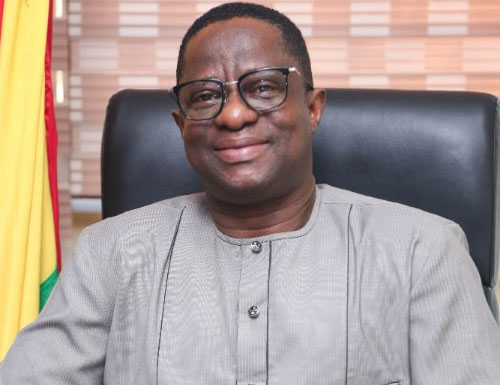John Peter Amewu
The Supreme Court has set aside the orders of a Ho high court, which placed an injunction on the gazetting of the Energy Minister, John Peter Amewu, as Member of Parliament-elect for the Hohoe Constituency in the Volta Region.
A five-member panel of the apex court in a unanimous decision has also quashed an order of the high court prohibiting the Electoral Commission (EC) from presenting Mr. Amewu to Parliament as MP-Elect for Hohoe.
The panel presided over by Justice Yaw Appau and assisted by Justices Samuel K Marful-Sau, Clemence Honyenuga, Gertrude Torkornoo and Amadu Tanko held that the high court did not have the jurisdiction to grant the two orders in favour of the applicants.
The court’s decision followed a writ of certiorari filed by the Deputy Attorney General, Godfred Yeboah Dame, challenging the ruling of the Ho High Court presided over by Justice George Buadi.
High Court’s Injunction
A Ho high court presided over by Justice Buadi on December 23, 2020 granted an interim injunction aimed at restraining the EC from gazetting Mr. Amewu as MP for Hohoe in the Volta Region.
The injunction was after an ex-parte application was presented before the court by lawyer for some residents who claimed to be from the Hohoe Constituency.
Lawyer of the applicants, Tsatsu Tsikata, who argued for the ex-parte motion, said the injunction was necessary because his clients who hailed from towns within the Hohoe Constituency were prevented from voting in the parliamentary elections that saw Mr. Amewu elected as MP for Hohoe.
Objection
But the AG’s office went to the Supreme Court challenging the decision and argued that the orders of the court presided over by Justice Buadi constituted a “flagrant abuse of the process of the court.”
The suit argues that the High Court has no jurisdiction under Article 33 of the constitution and Order 67 of the High Court (Civil Procedure) Rules, 2004, C. I. 47 to consider, determine or grant remedies in a matter of the nature of a parliamentary election petition, constitutionally required to be instituted under Article 99 of the Constitution and Section 16 of Representation of the People’s Law, 1992 (PNDCL 284).
The AG argues that “the wrongful assumption of jurisdiction by the court below and the orders made in consequence thereof, apart from being a patent error on the face of the record, portend a recipe for constitutional chaos. A possible consequence is that a part of the Hohoe Constituency will be in the Volta Region, and another part in the Oti Region, contrary to the express prohibition in article 47(2) of the Constitution and as interpreted by this court already.”
The suit is seeking an order of certiorari directed at the Ho High Court to bring into the Supreme Court for the purpose of being quashed the orders of the court dated December 23, 2020.
Recusal Argument
Even before the main case was heard, Mr. Tsikata, lawyer for the applicants at the high court, raised an objection urging Justice Clemence Honyenuga to recuse himself from being a member of the panel hearing the case.
He had argued that Justice Honyenuga was a close friend of Mr. Amewu, hence could be bias in the determination of the case before the court.
He added that there were witnesses who were willing to testify to the fact that the judge and the MP-Elect had a long standing close relationship.
The court however overruled the objection for lacking merit and also held that an allegation of bias against a judge was a serious case which must be backed with “irresistible evidence.”
Legal Arguments
During the hearing of the case, Deputy AG, Mr. Dame, argued that first that the application filed at the Ho High Court by the interested parties was a parliamentary election petition dressed as human rights action.
He argued that the High Court had no jurisdiction to entertain a parliamentary election petition as a human rights action under Article 33 of the 1992 Constitution.
Mr. Dame told the court that any attempt to dress a parliamentary petition as another action would be unlawful.
He further argued that Santrokofi, Akpafu, Lolobi and Likpr (SALL) are part of the Oti Region and, therefore, it could not be part of Hohoe Constituency which is in the Volta Region, hence the people of SALL could only vote in the Buem Constituency and not in the Hohoe Constituency.
Opposition
Mr. Tsikata in his argument urged the court to dismiss the certiorari application filed by the AG.
He said the admission by the Deputy AG showed that the right of the people of SALL to vote and be represented in Parliamentary was violated by the EC.
He argued that the right to vote was a fundamental human right which meant the High Court had the jurisdiction to entertain his clients’ application.
Ruling
The five-member panel of the court in a unanimous decision declared the orders of the High Court as null and void.
The court held that Mr. Amewu, though a beneficiary, had nothing to do with the denial of the right of the people of SALL to vote in the parliamentary elections.
The court also held that the applicants went to the Ho High Court with an election petition disguised as a human rights issue.
Meanwhile, the court has declined the request by the Deputy AG for an order prohibiting the High Court from continuing to hear the case before it.
The court held that it was for the trial court to determine whether the right to vote was a fundamental human right accruing to the interested parties (applicants before it).
BY Gibril Abdul Razak


